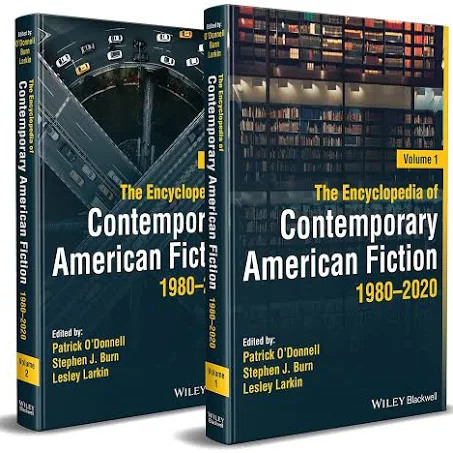Encyclopedia Giannina Braschi / John Wiley & Sons Ltd. /2022

The Encyclopedia of Contemporary American Fiction 1980–2020
Braschi, Giannina
Chapter 24 by Maritza Stanchich
Giannina Braschi’s United States of Banana (2011) takes off from her groundbreaking quasi-novel Yo-Yo Boing! (1998), and culminates a trilogy that began with El imperio de los sueños (1988), to mark a paradigmatic shift in the millennial poetics of witness of Martí’s and Whitman’s New York with a trans-canonical and trans-American postmodern performance that envisions the end of the American Century vis-à-vis Puerto Rico’s liberation from US colonialism. The timing couldn’t be more propitious, as the relationship between the US “colossus of the north” and Latin America plays out with an aborted rapprochement to Cuba and the economic collapse of Braschi’s homeland of Puerto Rico. Banana enacts simultaneously postmodern and protest poetics in dizzying global/local contexts, as US global hegemony declines post-9/11, as the United States becomes the second largest Spanish-speaking country in the world, and as Puerto Rico drowns in debt crisis – worsened by hurricane and earthquake disasters. Her trilogy’s avant-garde Spanish–English bilingualism wrestles staggering legacies of both these colonial languages of the Americas to forge parity between them, exposing officializing discourses of national literary canons and imperial powers on a global stage. From the perspective of immigrant New York, Braschi witnesses the “death of the salesman” in the apocalyptic ash of 9/11, with a rhetorically super-charged romp through genres, registers, canons, popular cultures, and dramatis personae, to imagine a carnivalesque end to US colonialism, forging what critic Madelena Gonzalez calls a “rogue aesthetic” that seeks to “rewrite radical politics as high art.”
Contemporary American Fiction by Giannina Braschi
(Encyclopedia Giannina Braschi / Chapter 24 / Excerpt from The Encyclopedia of Contemporary American Fiction 1980–2020 )
…The three works as a creative oeuvre also work through the considerably charged linguistic tensions and terrains of bilingualism in Puerto Rican, US Latinx, and trans-American terms with El imperio de los sueños, Yo-Yo Boing!, and United States of Banana in Spanish, avant-garde Spanglish, and English, respectively, and with all three translated to English and Spanish. Braschi’s invocation of “high art” and cosmopolitan celebration of New York sets her apart from the protest poetics and working-class ethos of Nuyorican poets, as does her coming from a “high bourgeois” Puerto Rican family (Ostriker 1994, p.vii), becoming a tennis champion and professional model in Puerto Rico, later studying in Madrid, living in Paris, Rome, and London before settling in New York. Yet because she has lived in New York since 1977, it would be remiss not to describe her as a diaspora, New York-based Puerto Rican author. In New York she worked as an academic and critic but increasingly dedicated herself to her art. Her readings/performances with panache and fashion flair seek a transformative audience experience linguistically and aesthetically that is dizzying in scope, abandoning North/South binaries, exalting in-betweenity as a twenty-first century praxis, and positioning a simultaneously colonized and cosmopolitan subjectivity. As Alicia Ostriker notes in the introduction to the translation of Empire of Dreams (1994), Braschi is not a protest poet, though deeply aware of politics and power” (p. vii). At once mixing cultural references such as Fellini and Cher, modes such as philosophy and queer erotica, acts such as contemplating Hamlet and taking a shit, standup and soliloquy, Braschi’s oeuvre mixes highbrow literary discourse with popular culture in ways that are unmistakably modern, urban, and sophisticated.
Of the three works, the most recent in English seems to be receiving more critical attention, in global/hemispheric/local contexts, being staged in New York (adapted and directed by Colombian director Juan Pablo Felix in 2015) and transformed into a graphic novel in Sweden (by Joakim Lindengren in 2017). One of the only critics relating all three works together is Arnaldo Cruz-Malavé (1996, 2014), on the arresting gender and sexuality implications of Braschi’s poetic vision of New York City. Taking all three works together as an unofficial trilogy also serves to chart how Braschi’s vanguard bilingualism in its multitude of registers breaks with previous theorizations of the functions of interlingualism in diasporic Puerto Rican and Chicano theory (Juan Bruce-Novoa 1990; Juan Flores and George Yúdice 1990; Frances Aparicio 1997, 1998), as well as with Puerto Rico’s insular cultural nationalist linguistic discourses (Jorge Duany 2002; Juan Flores 1979; Zilkia Janier 2005). Indeed, Braschi’s linguistic experimentation and generic hybridity challenge a trans-imperial history of global power relations between English and Spanish (as theorized by Walter Mignolo 2000) and exceed canonical traditions to put into relief their entanglements with hegemonic nation-state formations. Alexandra Vega-Merino describes the language of Yo-Yo Boing! as “shoring up creative energy for the challenge to develop a nuanced, original, playful and productive bilingualism.” Evelyn Nien-Ming Ch’ien’s suggestive readings of world literature in what she calls Weird English (2004) posit an English pollinated by other languages at the level of syntax in oeuvres of writers such as Junot Diaz and Salman Rushdie, which also applies to Braschi. And critic Lourdes Torres’ reading of Braschi’s “radical bilingualism” goes further to deepen this critical term (Torres 2007, p. 86).
Braschi’s language experiments also bring to the fore a vein of avant-garde literature of the Puerto Rican diaspora, as did the poet Pedro Pietri, along with distinct recent projects of Urayoán Noel, Edwin Torres, Lawrence La Fountain-Stokes, and the late Edgardo Vega Yunqué—as well as what I call “post-Nuyorican literature” including poets who uniquely venture into broadly comparative and international terrains. Among these are Victor Hernández Cruz, whose recent works explore Arabic and African linguistic influences in Spain, and Martín Espada, whose oeuvre straddles pan-Latino, trans-American literary traditions, engaging Latin American history as well as a global poetics of dissent. United States of Banana‘s fantastic mode in particular brings to mind Stateside Puerto Rican authors who use light sci-fi, fantasy, and magical realism to challenge and innovate gender, sexual, aesthetic, cultural dictates, such as Lyn Di Iorio, Charlie Vazquez, and playwright Quiara Alegría Hudes.
To read the full chapter by Maritza Stanchich, click here.
About The Encyclopedia of Contemporary American Fiction 1980–2020
Edited by Patrick O’Donnell, Stephen J. Burn, Lesley Larkin
John Wiley & Sons Ltd.

Fresh perspectives and eye-opening discussions of contemporary American fiction.
In The Encyclopedia of Contemporary American Fiction: 1980-2020, a team of distinguished scholars delivers a focused and in-depth collection of essays on some of the most significant and influential authors and literary subjects of the last four decades. Cutting-edge entries from established and new voices discuss subjects as varied as multiculturalism, contemporary regionalisms, realism after poststructuralism, indigenous narratives, globalism, and big data in the context of American fiction from the last 40 years.
The Encyclopedia provides an overview of American fiction at the turn of the millennium as well as a vision of what may come. It perfectly balances analysis, summary, and critique for an illuminating treatment of the subject matter. This collection also includes:
- An exciting mix of established and emerging contributors from around the world discussing central and cutting-edge topics in American fiction studies
- Focused, critical explorations of authors and subjects of critical importance to American fiction
- Topics that reflect the energies and tendencies of contemporary American fiction from the forty years between 1980 and 2020
The Encyclopedia of Contemporary American Fiction: 1980-2020 is a must-have resource for undergraduate and graduate students of American literature, English, creative writing, and fiction studies. It will also earn a place in the libraries of scholars seeking an authoritative array of contributions on both established and newer authors of contemporary fiction.
Encyclopedia Entries on Giannina Braschi
- The Routledge Handbook of Literary Translingualism edited by Steven G. Kellman and Natasha Lvovich, 2022
- The Encyclopedia of Contemporary American Fiction 1980–2020 edited Patrick O’Donnell, Stephen J. Burn, Lesley Larkin, 2022.
- Historical Dictionary of Postmodern Literature and Theater edited by Fran Mason, 2017.
- Encyclopedia of Hispanic-American Literature edited by Luz Elena Ramirez, 2010.
- The Greenwood Encyclopedia of Latino Literature edited by Nicolás Kanellos, 2008.
- Literatures of Latin America: From Antiquity to the Present edited by Willis Barnstone and Tony Barnstone, 2003.
Tags: Encyclopedia Giannina Braschi
